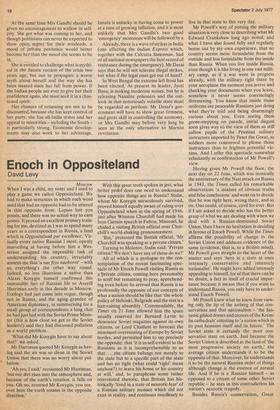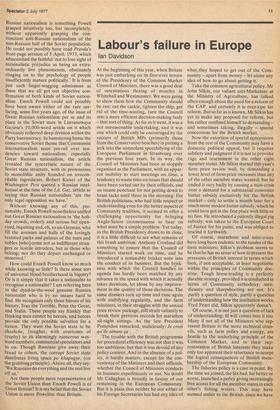Enoch in Oppositeland
David Levy
Moscow When I was a child, my sister and I used to play a game, we called Oppositeland. We had to make sentences in which, each word used that had an opposite had to be uttered in that opposite form. Lapses lost you points, and there was no actual way to earn points. It proved an excellent primary train- ing for me, destined as I was to spend many years as a correspondent in Russia, a land which is Oppositeland par excellence. Vir- tually every native Russian I meet, openly marvelling at having before him a Wes- terner assigend the impossible task of understanding his country, invariably assures me that 'u nas fsyo naoborot' —with us, everything's the other way round. Indeed, no less illustrious a native than Alexei Kosygin himself confirmed this immutable fact of Russian life to Averill Harriman early in this decade in Moscow. Ecology had just come into vogue, though not in. Russia, and the aging grandee of American diplomacy, in summarising for a small group of correspondents a long chat he had just had with the Soviet Prime Minis- ter (this is how close we get to the Soviet leaders!) said they had discussed pollution as a world problem.
'What did Mr Kosygin have to say about that?' we asked.
Mr Harriman quoted Mr Kosygin as hav- ing said the air was so clean in the Soviet Union that there was no worry about pol- lution. .
'Ali yes, I said,' recounted Mr Harriman, 'but our dirt rises into the atmosphere and, because of the earth's rotation, it falls on you. Oh no, retorted Mr Kosygin, you see, over here the earth rotates in the opposite direction.' With this great truth spoken in jest, what better prdof does one need to understand how opposite things are in Russia? Stalin, whom Mr Kosygin miraculously survived, proved himself equally aware of ruling over Oppositeland when in the spring of 1946, just after Winston Churchill had made his Iron Curtain speech in Fulton, Missouri, he chided a visiting British official over Chur- chill's world-shaking pronouncement.
'But,' protested the British official, 'Mr Churchill was speaking as a private citizen.'
Turning to Molotov, Stalin said: 'Private citizen? We don't have any of those do we?'
All of which is a prologue to the con- templation of the recent fascinating spec- tacle of Mr Enoch Powell visiting Russia as a tirivate citizen, coming here presumably to scoff but remaining to pray, apprehend- ing even before he arrived that Russia is so profoundly the opposite of our concepts of what a nation should be like that 'the whole policy of Helsinki, Belgrade and the rest is a hair-raising absurdity.' Commendably, the Times on 21 June allowed him the space usually reserved for Bernard Levin to denounce Soviet iniquities against its own citizens, or Lord Chalfont to forecast the imminent overrunning of Europe by Soviet hordes, and permitted him to say precisely the opposite: that 'it is as self-evident to the Russians as it is incomprehensible to us that. . . .the citizen belongs not merely to the state but to a specific part of the state and has no tight (what could 'right' mean anyhow?) to leave his home or his country at will,' and, to paraphrase some rather convoluted rhetoric, that Britain has his- torically 'lived in a state of neurotic fear' of a Russian military menace which did not exist in reality, and continues needlessly to
live in that state to this very day.
Mr Powell's way of putting the military situation is very close to describing what Mr Edward Crankshaw long ago noted, and what I have also found fully and regularly borne out by my own experience, that no country seems more formidable from the outside and less formidable from the inside than Russia. When you live inside Russia, even though it is like living in one vast milit- ary camp, as if a war were in progress already, with the military right there by your aeroplane the moment you arrive and checking your documents when you leave, somehow it never seems convincingly threatening. You know that inside those uniforms are peaceable Russians just doing what they're told and being disarmingly curious about you. Even seeing them goose-stepping on parade, initial disgust soon gives way to the view of them as still callow pupils of the • Prussian military instructors imported by Peter the Great, as soldiers more concerned to please those instructors than to frighten potential vic- tims. And I offer this spectacle somewhat reluctantly as confirmation of Mr Powell's view.
Having given Mr Powell the floor, the next day on 22 June, which was ironically the anniversary of the Nazi attack on Russia in 1941, the Times called his remarkable observations 'a mixture of obvious truths and false conclusions' and went on to decide that he was right here, wrong there, and so on. One could, of course, cavil for ever. But if I am asked to decide who has the better grasp of what we are dealing with when we deal with a Russian-dominated Soviet Union,'then I have no hesitation in deciding in favour of Enoch Powell. While the Times affirms the possibility of change in the Soviet Union and adduces evidence of the same (evidence, that is, to a British mind), Mr Powell goes straight to the heart of the matter and says 'here is a state at once intensely conservative and intensely nationalist'. He might have added intensely appealing to himself, for of that there can be no doubt, a fact in itself of crucial impor- tance because it means that if you want to understand.Russia, you only have to under- stand Enoch Powell.
Mr Powell knew what he knew from view- ing only the tip of the iceberg of that con- servatism and that nationalism — 'the fan- tastic gilded domes and crosses of the Krem- lin cathedrals' attesting to 'a nation which in its past honours itself and its future.' The Soviet state is certainly the most con- servative state on earth. Just because the Soviet Union is described as the land of 'the most progressive society on earth,' the average citizen understands it to be the opposite of that. Moreover, he understands it to be the natural Russian order of things although change is the essence of natural life. And if he is a Russian himself — as opposed to a citizen of some other Soviet republic — he sees in this contradiction his nation's neurotic tragedy.
Besides Russia's conservatism, Great
Russian nationalism is something Powell grasped intuitively too, but incompletely, without apparently grasping the con- comitant anti-Russian nationalism of the non-Russian half of the Soviet population. He could not possibly have read Pravda's front-page sermon of 5 April, 1973, which admonished the faithful 'not to lose sight of nationalistic prejudice as being an extra- ordinarily live phenomenon, obstinately clinging on to the psychology of people insufficiently mature politically.' It is from just such finger:wagging admissions as these that we all get our objective con- firmation of both kinds of Soviet nation- alism. Enoch Powell could not possibly have been aware either of the rare sur- facing, some five years ago, of the issue of Great Russian nationalism per se and its place in the Soviet state in Literaturnaya Gazieta's 10,000-word article on it which obviously reflected deep 'division within the Party bureaucracy. In hammering home the conservative Soviet theme that Communist internationalism must prevail over ten- dencies toward nationalism, especially Great Russian nationalism, the article revealed the syncretistic nature of the Soviet state structure, with its pretensions to monolithic unity founded on irrecon- cilable ingredients. Robert Kaiser of the Washington Post quoted a Russian intel- lectual at the time of the Lit. Gaz. article as saying that Russian nationalists 'are the only legal opposition we have.'
Without knowing any of this, pre- sumably, Enoch Powell nonetheless sniffed out Great Russian nationalism in 'the holi- day crowds, orderly and serious but open- eyed, inquiring and, oh, so un-German, who fill the avenues and halls of the lovingly restored parks and palaces of the tsars and nobles [who] come not as indifferent stran- gers or hostile intruders, but as those who belong; nor do they depart unchanged or unmoved.'
How could Enoch Powell know so much while knowing so little? Is there some sort of universal blood brotherhood in bigotry? Or is it simply that it takes a nationalist to recognise a nationalist? I am referring here to the dyed-in-the-wool genuine Russian nationalist who is by no means hard to find. He recognises only three heroes of his history, Ivan the Terrible, Peter the Great, and Stalin. These people say frankly that thinking men cannot be heroes, and heroes provide the only possible salvation for a nation. They want the Soviet state to be zhoshche, (tougher, with overtones of Cruelty) to its alarmingly numerous way- ward members, commercial speculators and so on. Though Russians give away. their bread to others, the corrupt Soviet state distributes living space po khapugye, (on the grabbing principle). Above all, they say: `We Russians do everything and the rest live off us.'
Are these people more representative of the Soviet Union than Enoch Powell is of Great Britain? It is my belief that the Soviet Union is more Powellite than Britain.



































 Previous page
Previous page